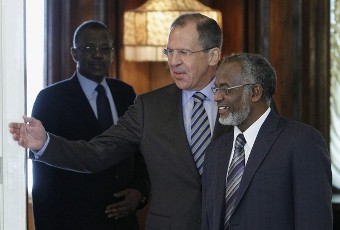Russia appears supportive of proposed UNSC resolution on Sudan
April 30, 2012 (KHARTOUM) – The Russian government signaled its approval of a move by the United Nations Security Council (UNSC) to adopt a resolution that calls on Sudan and South Sudan to return to negotiations and put an end to hostilities that have raged over the last few weeks.

The seven-point roadmap also called on both sides to cease hostilities within 48 hours and called for the “unconditional” withdrawal of troops from disputed areas. It also called for cessation of harbouring of, or support to, rebel groups against the other state and cessation of hostile propaganda and inflammatory statements in the media.
Should either side not comply, the AU expressed readiness to take “appropriate measures” without specifying its nature but were understood to mean sanctions.
AU’s position came in the wake of the most serious unrest since the South’s independence last year after Juba’s troops briefly occupied the oil-rich region of Heglig this month.
The US circulated a draft resolution in support of the AU position and also threatened sanctions under Article 41 of the UN charter, which allows the council to impose economic and diplomatic sanctions on countries that ignore its decisions.
Sudan said it opposed any UNSC intervention in its dispute with South Sudan and insisted that the AU be the sole body in charge of the process.
The Sudanese foreign minister Ali Karti traveled to Moscow and met with his Russian counterpart Sergei Lavrov in a bid to convince his country’s traditional ally to support Khartoum’s position.
But while Lavrov signaled reservations on the issue of sanctions he said that Moscow backs the UNSC resolution.
The resolution “says that the Security Council will consider the sides’ actions, and depending on how they implement this resolution, the Council intends to discuss possible further steps,” Lavrov told reporters.
“Yes, it may include measures of economic pressure. But I would repeat that this is not an automatic decision, but only an intention depending on how the resolution is implemented,” he added.
The Russian foreign minister added that Russia intended to make sure the draft was fair and “addressed to both sides” while leaving the African Union in charge of mediating an end to the month of fighting in the oil-rich region.
In New York, Western diplomats told Reuters that China and Russia were resisting any reference to article 41 in the draft resolution during negotiations on the text today at the US mission.
“The draft will probably change before it goes to a vote, which we hope will happen on Wednesday,” a diplomat told Reuters. “China doesn’t want any mention of Article 41.”
Beijing, which has close trade relations with both Khartoum and Juba, has traditionally acted as Sudan’s protector on the council and for years has shielded it from US and European calls for sanctions due to its handling of conflicts in its western Darfur region and elsewhere in the country.
Russia is supporting China’s push to water down the resolution and also dislikes the idea of mentioning Article 41 in the resolution, council diplomats said.
Under the latest US draft, as with two previous versions, the council would have to pass a new resolution to impose sanctions on either Khartoum or Juba for not ending hostilities.
The United States made an attempt to soften the language in the latest draft. The first version, obtained by Reuters, warned Khartoum and Juba of “its determination, in the event that one or both of the parties have not complied, to take appropriate additional measures under Article 41 of the (U.N.) Charter.”
The latest version, also obtained by Reuters, softens it by speaking of the council’s “intention” to take steps under Article 41 in the event of non-compliance.
In a related issue, the AU hailed the announcement by South Sudan that it will pull out its troops from the disputed Abyei region.
AU Commission Chairman Jean Ping in a statement praised Juba “for responding promptly and positively to the call”.
“This important decision will greatly contribute to the efforts aimed at defusing tension between Sudan and South Sudan,” Ping said.
(ST)
